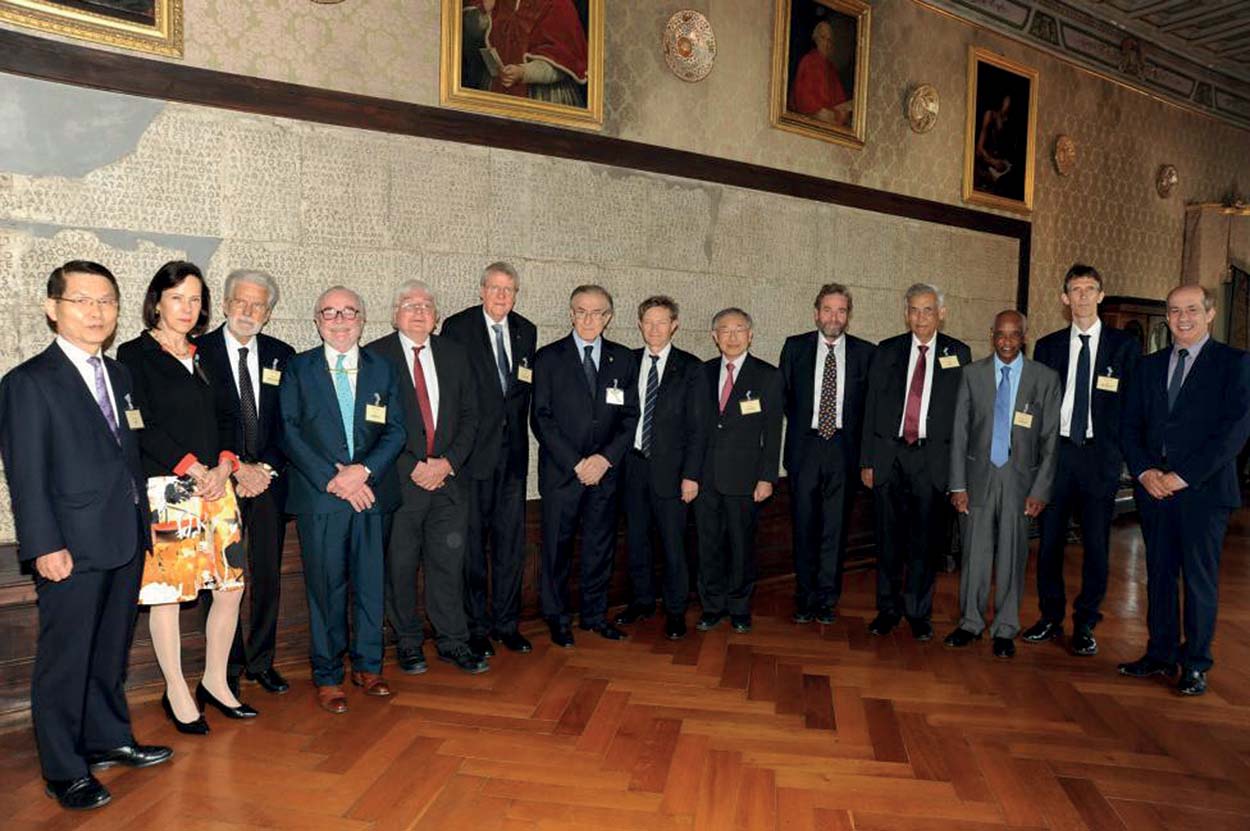
New Economic Growth
The role of Science, Technology, Innovation and Infrastructures.
Science, technology and innovation task have long been significant drivers of economic growth and human development. Growth relies on bringing together basic and applied research, on both a public and private level, internationally. The challenge is to make sure that, even during periods of economic slowdown, science and technology continue to focus on targets related to sustainability and improving living conditions in all nations.
HERE IS THE JOINT STATEMENT BY THE G7 ACADEMIES OF SCIENCE THAT MET IN ROME ON 3RD MAY CHAIRED BY ALBERTO QUADRIO CURZIO
Introduction by Alberto Quadrio Curzio
The Joint Statement «New economic growth: the role of science, technology, innovation and infrastructure», the result of a year’s work, is a document in which every word has been carefully studied and then validated at the meetings held on 23rd-24th March 2017 involving scientists representing the National Academies of G7 countries. The draft copy presented by the Lincei at the meetings was written under my supervision by a Work Team composed of Lincei members Sergio Carrà, Massimo Inguscio and Alessandro Roncaglia, with the backing of such outstanding scientists as Fabio Beltram, Mario Pianta, Patrizio Bianchi and Edoardo Reviglio.
Consequently, there is nothing to add to the Joint Statement, but I am only too pleased to give my own personal thoughts to express my sincere thanks to Mapei, which, along with others, supported the Lincei in carrying out all the organisational and hospitality work. I firmly believe that the scientific and technological revolution underway will result in paradigms of new economic growth, which will inevitably have to take into account the various aspects of sustainability referred to in the 2030 Agenda promoted by the United Nations aimed at reducing the gap between the north and south of the world. All this requires massive investment in research, education, training and, more generally speaking, both tangible and intangible infrastructure to encourage inclusive growth. Without these investments, the imbalances between the north and south of the planet will only increase. But we do not have much time on our hands, because demographic growth in Africa will see the population rise from 1250 million to 3500 million by 2050. Figures which clearly indicate that migration cannot be the solution.
Over the last three years, the G20 have rightly emphasised this theory, but it seems to us that governance policies supporting cooperation between the public and private sectors are still weak. We have great belief in supranational organisations and multilateral development banks that are working in this direction, although at quite different rates. European policies, although relatively weak, also point towards operations of this kind.
The Lincei have been thinking along these lines for a decade, partly with the contribution of high-tech companies to prove that techno-science, infrastructure and sustainable growth are highly interconnected. The gap between the financial economy and real economy needs to be narrowed by drawing in enormous worldwide financial resources to create a system of tangible and intangible infrastructure focusing on creative solidarity.
POLICY RECOMMENDATIONS
The Academies of Science of G7 nations are urging governments to:
• Increase in investments and capabilities in pre-competitive science and technology;
• increase investment in infrastructures - both tangible and intangible - which contribute to inclusive growth and progress in science and technology;
• promote the development of expertise in designing, engineering, producing and marketing products and services based on the latest science and technology;
• promote open access – subject to appropriate regulations on intellectual property - to advances in science and technology, preventing monopolistic practices from taking hold;
• share effective practices and policies that promote innovation, the sharing of technology and efficient development of infrastructures. Action like this could be taken in conjunction with all appropriate partners, such as National and Multilateral Development Banks, particularly with a view to reducing the gap between the North-South;
• ensure an appropriate governance framework is adopted, so that the benefits of science and technology are fully exploited while maintaining people’s trust.
1. CHALLENGES
1.1. Science and technology for growth and sustainability
Science, technology and innovation task have long been significant drivers of economic growth and human development. Growth relies on bringing together basic and applied research, on both a public and private level, internationally. The challenge is to make sure that, even during periods of economic slowdown, science and technology continue to focus on targets related to sustainability and improving living conditions in all nations. Specific institutional frameworks are required to make sure that the potential of both science and technology is aligned with the paths and strategies of economic growth, social inclusion and environmental sustainability, as argued by the United Nations report, “Transforming our world: the 2030 Agenda for Sustainable Development”. This year, our statement underlines the importance of investing in science, technology and infrastructures in accordance with Goal no. 9 of the UN 2030 Agenda for Sustainable Development: “Build resilient infrastructures, promote inclusive and sustainable industrialisation and foster innovation”. In the aftermath of the 2008 economic recession that has slowed down worldwide economic growth, we must make sure that investment in science, technology, innovation and infrastructures increases to help bring about inclusive and sustainable worldwide growth.
1.2. Technological and innovation drivers for new growth
Innovation has played a crucial role in the rapid growth of both advanced and emerging economies. Nevertheless, there are growing concerns that the benefits of economic growth guided by technology have not reached every member of society. In addition, economic growth is raising demands on limited natural resources and is contributing to climate changes. In addition, the spread of new information technologies also raises issues of ethics, privacy, security and trust. Today, technological drivers are causing increasing impact on:
• The digitalisation and automation of production, including the integration of various drivers in the reorganisation of economic activities;
• Smart systems, particularly in the fields of renewable energy, transport, mobility and man-machine interfaces;
• Artificial Intelligence with its capacity to alter the balance between life and work and impact on many other fields, such as transport and health care;
• Biomedical technology exploiting emerging knowledge from genomics and its expansion into other realms of the ‘omics’ revolution, with benefits extending beyond just health;
• Sustainable forms of technology that can reshape production and in ways that conserve natural resources, reduce climate change and improve the quality of the environment. Attention needs to be focused on emerging forms of technology, which can impact on practically every single economic activity;
• Nano, Bio and Quantum technologies making it possible to control matter (everything from inorganic to living matter) on an atomic level, with boundless applications in industry, health and infrastructure);
• Data Science, thanks to its capacity to generate new knowledge and policy capability by the integrated algorithmic analysis of diverse data, currently generated at an exponential rate. These scientific advances - and others that will emerge in the realms of materials, information and other fields – have disruptive potential and deserve attention not just in terms of public and private investment, but also as regards the need for new public policies capable of ensuring the benefits of science and technology are fully exploited, while moving towards global sustainability, inclusion and social responsibility.
2. STRATEGIES AND PUBLIC POLICIES
2.1. Investing in science and technology
Increasing public and private investment in science and technology is required to take on the challenges associated with sustainable and inclusive growth. Expenditure on research and development as a share of the Gross Domestic Product (GDP) has only increased in a few countries and dropped or remained the same in several developed and emerging nations. This contrasts with the policy objectives of many nations, such as the European Union’s “Europa 2020” goal of spending 3% of GDP on research and development. Current gaps in commitment to research and development make it harder to access, adopt and expand knowledge and innovation, thereby limiting any possible benefits. Public policies need to acknowledge the essential role spending on fundamental research, the advancement and diffusion of knowledge, culture, higher education and innovation can play in supporting quality socio-economic growth and that these benefits outweigh short-term concerns about balancing public finances. Many businesses have recently decreased investment in research and technology - which calls for a long-term perspective on investments - preferring short-term returns from financial operations; this is yet another threat to economic growth. Well-planned public policies could encourage longer-term private investment, also supporting high-risk enterprises. In some cases, public-private partnerships and fiscal incentives could encourage joint business investment in precompetitive research in science and technology. Various arrangements for securing finance - both public and private - are required for G7 nations to hit the United Nations’ Sustainable Development Goals. These funds could support infrastructures and environmentally sustainable investment and infrastructure and also help develop products, processes and organisations consuming less energy, land and natural resources that have less impact on the climate, moving towards renewable energy sources and sustainable transport systems, which take into consideration the repair and maintenance of existing infrastructure and protect natural ecosystems.
2.2. Investing in infrastructure
The provision of both tangible and intangible infrastructures is a prerequisite for inclusive and sustainable growth and an important example of the need for public intervention. Growth based around new technology calls for new types of infrastructure: digital connectivity, broadband communication systems, smart renewable energy grids and sustainable transport systems require the developing of new or upgraded infrastructures. At the same time, more powerful cooperation networks are required in research, knowledge generation, technology transfer, the spread of innovation, human resource development, education, re-training and skills, raising public awareness and dialogue about science and technology. Due to the recent slowdown in the economy, most nations have reduced their spending on infrastructure and public investment, despite the availability of low-cost financing. A new growth in investment is now required, as has been underlined, for example, by the OECD and G20 summits in Turkey (2015) and China (2016). Several studies have documented the huge gap between current investment in infrastructure and that needed to achieve the United Nations’ Sustainable Development Goals. Innovative solutions drawing heavily on new technology might make it possible to provide and manage these infrastructures at lower costs. This lack of investment means that the current slowdown in worldwide growth is destined to continue.
2.3. Innovation diffusion: matching institutions and markets
A series of conditions must be in place if innovation is to promote shared, sustainable growth. On the supply side, proper long-term public financing in research and development is required to promote knowledge as a public asset. Demand - both private and public - four goods and services linked with new technology must also be suitably high. Governments have an important role to play in stimulating this new demand through targeted public research plans, procurement for public services and public investment in infrastructure. In order for financial projects, markets and social enterprises based around new technology to emerge, institutions, rules and appropriate reference frameworks must be set in place. Examples include common standards, global platforms and digital networks. Developing these and other activities needs to be based around shared ethical values, protecting privacy and security, and rules ensuring access and preventing the emergence of monopolies. Suitable institutional agreements on an international scale are required to take on these challenges.
2.4. Reducing the North-South divide
There is evidence of divergence in science and technology activities and investment in infrastructure among and within G7 and G20 countries, as well as between the North and South. All nations - including emerging countries - should be encouraged and supported in their need to allocate more resources to research, education and innovation. In addition, the success of certain emerging economies has shown the value of spreading scientific knowledge, technology and education. Nevertheless, the North-South divide is still big, particularly as regards science and technology, and new disparities are likely to emerge in digital technology, access to knowledge, environmental conditions and health care. International agreements to ensure an open scientific system and reciprocally favourable technology flows between nations are an important condition for making more progress. To meet these challenges, Multilateral and National Development/Promotional Banks must take on a more significant role in addressing such challenges, as they combine governmental legitimacy, a policy mission and their own direct intervention on the global financial markets. They can mobilise large private financial resources, ensure suitable investment policies, manage and control the intervention of innovative infrastructural projects.
3. THE ROLE OF G7 ACADEMIES
The Academies of Sciences of G7 countries have important responsibilities in identifying the challenges for research and in promoting effective institutional frameworks capable of providing technological solutions for inclusive and sustainable growth. We reaffirm that science is an international endeavour and cooperative enterprise. The role of these Academies as guardians of the values of free inquiry and the fundamental importance of scientific evidence is more vital than ever. In advising governments on policy, the Academies should adopt a holistic approach to issues of sustainable growth based around interdisciplinary research involving the natural, social and human sciences. The Academies are also committed to promoting public forums for discussing important developments in science and technology, notably focusing on the links between them. To achieve these goals, the Academies of Science of G7 countries are committed to working together - both directly and through international associations - to tackle international-scale issues, find joint solutions and assess all the implications of political choices.
4. RECOMMENDATIONS TO G7 GOVERNMENTS
Through this Statement, G7 Academies of Science call on governments of G7 nations to take action to implement the UN 2030 Agenda for Sustainable Development, paying particular attention to Goal no.9 on innovation and infrastructures. Investment in science, technology, innovation and infrastructure are an essential driver for inclusive and sustainable worldwide growth. To this end, G7 Academies of Science urge their governments to act on the policy recommendations listed above.









